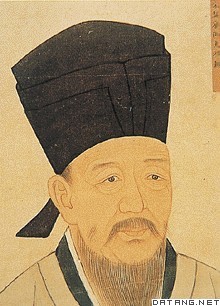Cheng Hao facts for kids
Quick facts for kids Cheng Hao |
|||||||||||||||||||||||||||
|---|---|---|---|---|---|---|---|---|---|---|---|---|---|---|---|---|---|---|---|---|---|---|---|---|---|---|---|

Cheng Hao
|
|||||||||||||||||||||||||||
| Traditional Chinese | 程顥 | ||||||||||||||||||||||||||
| Simplified Chinese | 程颢 | ||||||||||||||||||||||||||
|
|||||||||||||||||||||||||||
| Alternative Chinese name | |||||||||||||||||||||||||||
| Chinese | 伯淳 | ||||||||||||||||||||||||||
| Literal meaning | (courtesy name) | ||||||||||||||||||||||||||
|
|||||||||||||||||||||||||||
Chéng Hào (Chinese: 程顥, 1032–1085) was an important Chinese philosopher and politician. He was also known by his courtesy name, Bóchún (Chinese: 伯淳). Cheng Hao came from Luoyang, China.
When he was young, Cheng Hao and his younger brother, Cheng Yi, learned from Zhou Dunyi. Zhou Dunyi was one of the key thinkers who helped create Neo-Confucianism. This was a new way of understanding ancient Chinese ideas.
Cheng Hao's philosophy looked at two main ideas:
- Qi: This means everything we can touch and feel.
- Li: This means everything that is not physical, like ideas or principles.
He believed that all these non-physical things were connected. He thought that a single, universal principle was inside everything. This was different from some other ideas that said these principles were in a separate, outside world.
Cheng Hao once said, "Outside of dao (the way or principle) there are no things, and outside things there is no dao." This means he believed that principles and things are always linked. He also said, "We call it god to emphasize the wonderful mystery of principle in ten thousand things." This shows his belief that a deep, guiding principle exists in everything.
Life of Cheng Hao
Cheng Hao's grandfather was a local official in Huangpi. He died there, and Cheng Hao's father, Cheng Xiang, was too young to go back to their hometown of Luoyang. So, Cheng Xiang grew up in Huangpi. Later, Cheng Xiang became a county official himself. It was there that his two sons, Hao and Yi, were born.
In 1057, Cheng Hao passed the Imperial examinations. These were very tough tests that people had to pass to become government officials. After passing, he became a scholar and worked in different government jobs. He served as a clerk in Hu County, Shaanxi, and later in Shangyuan County (which is now part of Nanjing). He also worked as a director in Zezhou. Over time, he held many other important roles, like a minister of ceremony, a Censor (someone who watched over officials), and a tax official.
The Two Chengs
Cheng Hao and Cheng Yi were very important in starting Neo-Confucianism during the Song Dynasty. Many people see them, along with Zhu Xi, as the main founders of this new way of thinking. People often called the brothers "The Two Chengs" (Chinese: 二程). Cheng Hao was sometimes called "Cheng the Elder" (Chinese: 大程) and Cheng Yi was "Cheng the Younger" (Chinese: 小程).
The brothers studied the universe and celestial bodies a lot. They used Neo-Confucian ideas to understand how the cosmos worked. They especially focused on the idea of li, which means the Divine or Natural Order. They believed this li was the original and guiding power behind Tian, or the Heavens.
Cheng Hao also started schools in Fugou and Songyang. He believed that studying and learning were ways for people to become sages. A sage is a very wise and good person. He once wrote that a "superior man" (a good and noble person) must aim to become a sage through study. Cheng Hao passed away in 1085 when he was 53 years old.
Cheng Hao's Legacy
Cheng Hao was known for being friendly, relaxed, and full of life. This was quite different from his younger brother, Cheng Yi, who was more serious. As Neo-Confucianism became more popular, the two Cheng brothers, along with Zhou Dunyi, Zhang Zai, Shao Yong, and Sima Guang, became known as "The Six Masters of Northern Song." They were celebrated for their important ideas and contributions to philosophy.
After his death, Cheng Hao received several special honors called posthumous titles. These are titles given to someone after they have passed away.
- In 1220, the emperor gave him the title "Lord of Purity" (Chinese: 純公).
- In 1241, he was given the title "Bo [Earl] of Henan".
- In 1330, an imperial order made him the "Lord of Yu Kingdom [Henan]".
Cheng Hao's descendants also held a special title called Wujing Boshi (Template:W:zh:五經博士). This title was also given to the descendants of other famous philosophers like Mengzi, Yan Hui, Zhou Dunyi, Cheng Yi, Zhu Xi, Zeng Can, Zhang Zai, and Shao Yong. This showed the high respect for their families and their contributions to Chinese thought.
See also
 In Spanish: Cheng Hao para niños
In Spanish: Cheng Hao para niños
 | Jessica Watkins |
 | Robert Henry Lawrence Jr. |
 | Mae Jemison |
 | Sian Proctor |
 | Guion Bluford |

